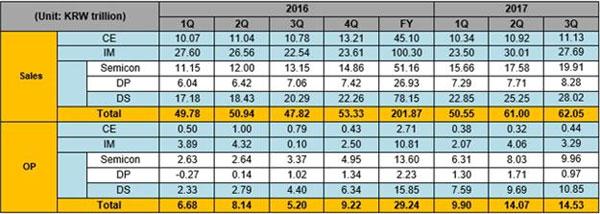

Net profit for the quarter came to KRW11.19 trillion, compared to KRW4.45 trillion for the same quarter of 2016.
In third-quarter 2016, strong demand for high-performance memory chipsets for servers and flagship mobile devices was a contributing factor to the company's overall robust performance, according to Samsung. The Semiconductor Business registered significant earnings growth both on year and on quarter. The System LSI added to the earnings rally through increased sales of DDIs and image sensors.
The display panel segment posted an earnings decline despite the expanded sales of flexible OLED panels for premium smartphones, Samsung said. The Mobile Business saw strong shipments thanks to the launch of Galaxy Note 8 and solid sales of the new Galaxy J series, but its earnings declined sequentially due to the higher sales proportion of mass-market smartphones.
The Memory Business achieved strong earnings results for the quarter on the back of high seasonal demand for all memory applications, the trend toward higher density chips and a continuation of favorable supply and demand conditions and prices, said the vendor. For NAND, the launch of flagship smartphones and the expansion of cloud infrastructure drove strong demand. For DRAM, demand for applications used in servers, mobile devices, PCs and game consoles also remained solid.
For the OLED business, an increase in shipments of flexible displays for customers' new flagship smartphone launches drove an increase in sales. However, earnings declined sequentially due to an increase in start-up costs of the new OLED production line and increased competition within rigid OLED products. For the LCD business, third quarter earnings declined, as an imbalance in supply and demand led to a decrease in the ASP of LCD panels. Furthermore, capacity expansion in the LCD industry continues to impact prices.
Samsung's TV business saw significant improvements in earnings sequentially, driven by increased sales of premium products including QLED TVs. However, due to the higher cost of LCD TV panels and weakening demand of the TV market, earnings were modestly lower compared to the same period of last year.
Looking ahead to the fourth quarter, the company anticipates tight supply and demand conditions to continue for the Memory Business due to strong demand for servers and mobile devices. For the Display Panel segment, increased shipments of flexible OLED products and the release of new rigid OLED panels will improve earnings. However, the LCD segment will be met by weak seasonality, coupled with expanded panel supply. For the Mobile Business, the company will try to maintain solid earnings by increasing flagship sales through the global roll out of the Galaxy Note 8. Meanwhile, the Digital Appliances Business expects to continue revenue growth by ramping up sales of new products including washing machines with QuickDriveTM technology and POWERstick PRO vacuum cleaners. The TV business will focus on increasing sales of premium products including QLED and ultra-large screen TVs.
Moving on to business prospects for 2018, the company expects earnings to grow primarily from the component businesses, as conditions in the memory market are likely to remain favorable and the company expects increased sales of flexible OLED panels. For the Memory Business, demand for high-density, high-performance NAND will increase, as the need for larger data capacity in servers and mobile devices grows.
The company expects positive growth in the DRAM market, due to the development of technologies in big data, artificial intelligence (AI) and machine learning, in which faster processing and analysis of data are critical. The technological advancement of mobile devices with dual camera, 3D sensors and on-device AI will spur DRAM growth. As for next year's outlook for the System LSI and Foundry Businesses, Samsung will continue to drive favorable earnings growth by increasing the supply of 10nm products and image sensors, and will also focus on strengthening the competitiveness in the sub 7nm process through investment in the EUV-related infrastructure.
In the display segment, Samsung will continue seeking growth by addressing market demand for flexible OLED display panels with differentiated technology, as OLED is set to become a mainstream feature in smartphones. Although global competition in the LCD panel business is expected to intensify in 2018, Samsung will strive to ensure its profitability by solidifying partnerships with key customers and enhancing the lineup of ultra-large size, high resolution, quantum dot and frameless panels.
As for the Mobile Business, Samsung will strengthen its leadership in the high-end market with flagship smartphones and improve profitability through optimizing product lineups. Moreover, the company will strive to secure business growth opportunities through new technologies such as 5G and by strengthening the services and software competencies.

Samsung consolidated sales and operating profit by segment, 1Q16-3Q17.
Source: Company
Rodney Chan, DIGITIMES, Taipei [Tuesday 31 October 2017]
Source: Digitimes